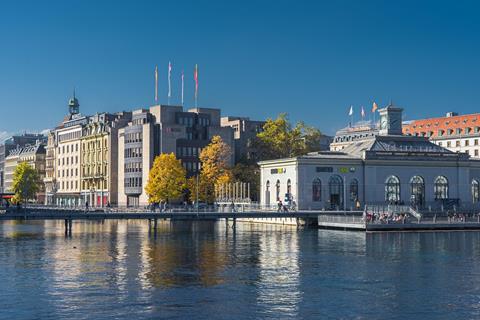The cantons of Geneva and Neuchatel are the latest in Switzerland to back the creation of cash rebate initiatives to attract national and intern
The cantons of Geneva and Neuchatel are the latest in Switzerland to back the creation of cash rebate initiatives to attract national and international filmmakers to shoot films in their respective regions.
The Canton and City Of Geneva announced in Locarno at the weekend that they are launching the Geneva Film Commission, which will be made up of two complementary components.
The first stage will see the opening of the Geneva Film Office under the auspices of the Geneva Tourism & Congress Foundation to support productions by facilitating and simplifying procedures such as issuing shooting permits for filming in public spaces.
Additionally, the Film Office will be responsible for promoting Geneva’s audiovisual ecosystem at professional events in Switzerland and worldwide.
In a second stage set to come into effect from next year, a cash rebate programme will allow for the reimbursement of up to 30% of eligible local expenses incurred within the canton by film and TV productions.
Samuel Mellot, economic affairs officer overseeing the digital economy and imaginative industries at the cantonal office for economy and innovation, explained that a cap has been set at CHF500,000 ($617,000) per project. It is expected that every Swiss franc invested will be able to generate between 3.5 and 4.5 francs of economic benefit.
Geneva is home to almost 50% of all film shoots in French-speaking Switzerland. It has hosted productions such as Laurent Négre’s Operation Casablanca, and Jean-Pierre Améris’ Aimons-Nous Vivants as well as visiting international productions such as Stephen Gaghan’s Syriana and Jérome Salle’s The Burma Conspiracy.
Moreover, the region has a diverse audiovisual sector, serving as home to production companies such as Akka Films, Close Up Films and Rita Productions, as well as postproduction houses including Masé Sound Studios, specialist academic institutions, the University of Art and Design HEAD and the SAE Institute, professional association Fonction Cinéma and the local public broadcaster RTS.
“We are delightet this project, initiated by the City of Geneva, is now coming to fruition,” said Marie Barbey-Chappuis, head of the city’s Department of Security and Sport. “This initiative will enhance the economic attractiveness of our city and will also help to promote Geneva as a destination and boost its international image.”
Cléa Redalié, head of the Cantonal Cultural Service, pointed out that the cash rebate scheme should be seen as complementing and not replacing the existing culturally-oriented regional fund Cinéforom, which covers the whole of French-speaking Switzerland with an annual budget of around CHF10m ($12m).
Neuchatel incentive
Meanwhile, the Canton of Neuchatel has agreed after four years of lobbying by the Neuchatel Films audiovisual professionals association to launch a pilot project giving up to 15% reimbursement of eligible expenses, with a cap of CHF 150,000 ($185,000) per project.
The Neuchatel canton is on the western border of Switzerland to France. It is one of 26 Swiss cantons.
Neuchatel Films’ vice president Florence Adam explained in Locarno that the pilot cash rebate had come about after Rita Productions expressed interest in shooting Lea Fazer’s series Placée in the region.
The six-part psychological thriller, which has been shooting this summer and will return for a second block of filming in September, is expected to have spent around CHF1m ($1.2m) in the canton and will therefore be reimbursed the maximum amount possible.
Adam added that the canton has commissioned a report from Neuchatel Films to analyse the impact of the shooting of this series on Neuchatel with a view to establishing a film commission and cash rebate scheme in the future.
Swiss rebates
The developments in Geneva and Neuchatel follow the previous launch of cash rebate schemes already operating by the film commissions in Italian-speaking Ticino, the Valais region in the southwest corner of Switzerland, and the canton of Zurich.
Valais became the first region in Switzerland in 2022 to launch an automatic cash rebate scheme to attract Swiss and international audiovisual productions.
A rebate of between 15% to 35% can be granted, depending on the type of production and the criteria met, with the current maximum amount paid out pegged at CHF 100,000 ($124,000) per production.
The Film Commission Zurich’s production incentive supports projects of all sizes and is aimed exclusively at international productions and minority co-productions. Producers can apply for this cash rebate of up to CHF30,000 ($37,000) if their project has eligible expenditures of at least CHF500,000 ($618,000) incurred within the Canton of Zurich.
Meanwhile, the Ticino Film Commission partially covers expenditures in production from pre-production to postproduction, with the methods of disbursement being assessed individually for each specific project.
Switzerland also has a national cash rebate scheme, PICS, which has a budget of CHF6m ($7.4m) per year and supports about 30 projects per year. The focus is on international feature film co-productions with a maximum amount of CHF 600,000 ($741,000) paid to a project. The rebate can be 20-40% of eligible production expenses. The higher rebate amount of 40% applies if it is a minority co-production.
The PICS funding can be combined with the rebates from the Swiss film commissions’ schemes.

COMMENTS